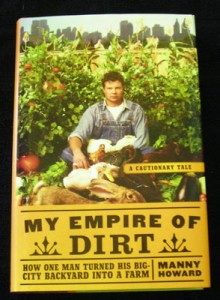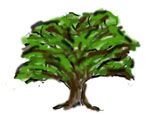It’s difficult to know what to say about this one, especially since this is Green In Oak Park’s first book review, and also because I have very mixed feelings about the book in question.
The author is a journalist who lives in a house in Brooklyn with his wife, two small children, and a dog. He’s approached by a magazine to do a piece on urban farming and the locavore movement from the perspective of producing one’s own food, so he sets to work creating a backyard full of crops and what he considers animals for meat in order to sustain himself for a month. The animals include ducks, chickens, and rabbits.
This book is not a how-to. There are many useful facts included, but this book won’t tell you everything you need to know in order to do what the author did.
The bulk of the book includes much more about the raising and slaughtering of meat animals than about the cultivation of crops, unless you include the long sections explaining how he turned his backyard of clay into a more fertile area for actual plants. It is the tales about the animals that give me pause. I don’t eat meat except for some fish, so I’m what’s commonly known as a pescetarian. I’m also an animal lover, and while I never tell other people what to eat and what not to eat, I think most animal lovers would recoil at some of these stories of death. Many of them are not without considerable suffering and could have been avoided. There was one squirrel death that seemed particularly horrifying to me.
The author expresses some remorse for these deaths and certainly doesn’t seem to advocate the case for complete hardheartedness, but in his tone in general, he seems to hold the audience at a distance. I was never sure exactly how much he regretted his own mistakes or the suffering of these animals, so I found it difficult to empathize with him. I’m not entirely sure why he took on this project as he seemed more passionate about it as a project than about any devotion to or desire to explore the local food movement, and I’m not clear what conclusions he would draw from his experiment other than to say that it’s very hard to produce your own food on a very small plot of land.
That is not to say that I don’t recommend reading it anyway, but do be prepared. It is not all – or even mostly – sweetness and light, and anyone in an urban area considering raising animals for meat might want to read it. If you eat meat, you should know where it comes from and you should know that death is not only involved, but said death can be sad and gory and disturbing as well. In urban areas, we are in general greatly removed from the entire process of food production. Knowing more about where our food comes from can only benefit us.





